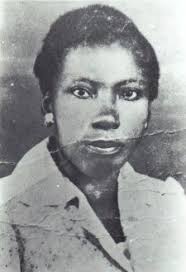If you enjoy learning about interesting facets of our heritage and history, please consider joining the National Trust to support our Research and Outreach.
Names like Tubal Uriah “Buzz” Butler, Captain Cipriani and Cola Rienzi echo throughout history as powerful leaders involved in the labour revolution of the 1930’s and rightfully so. These men deserve the praise and recognition associated with this moment in history, but this article seeks to shift the focus to the overshadowed women of the labour movement, specifically, Elma Francois, a name not often heard alongside the names of these powerful men.

Elma Francois (1897-1944)
Elma Francois was born on October 14th, 1897, on the island of St. Vincent. Her parents were labourers on the island and lived a life of poverty. When she moved to the capital of Kingstown with her family, Francois witnessed with her own eyes the depravity of society at the time; social conditions were deplorable and her own family experienced poverty. This ignited her interest in politics and activism. Her introduction into labour activism started with cotton labourers who worked on the same estates that she worked on.
In 1919, she sought out new opportunities and migrated to Trinidad. At this time, the Depression shook the Caribbean and the search for economic opportunities was paramount, so she took up work as a washerwoman and a domestic servant in Port of Spain. At the meagre age of 22, she ventured alone to another country and claimed her independence. Not long after arriving in Trinidad, she joined the Trinidad Workingmen’s Association led by Captain Cipriani at the time. (Name changed to Trinidad Labour Party after 1934).
Her approach to spreading political and social activism took a different path from her counterparts in the organisation as she hosted “rap sessions” held by candlelight in squares around the capital to inform and educate the people of the nation. She led hunger marches around Port of Spain, to inspire, create conversation and draw attention to the inequality in the country. She adopted an approach of immersing herself with the people in need, speaking with them, talking to them, integrating with them to truly understand their plight, and let us not forget she considered herself as one with the people as she too came from an underprivileged past. Reaching past the limits of the TWA she often took a stand during rallies to challenge her colleagues for, what she considered, their “gentle” approach to tackling the societal issues at play in the country after 1936.
1934 saw the formation of a new labour party called the National Unemployed Movement (NUM), of which Francois was a co-founder. This party grew to become a larger and more organized movement eventually changing the name to the Negro Welfare Cultural and Social Association (NWSCA). This organisation held socialist values and positioned its goals and initiatives on championing the causes of the impoverished and the proletariat or working class of the country. It introduced structure to the female coal workers on the capital’s docks and domestic servants. NUM took a stand against the Shop Hours Ordinance which regulated opening and closing hours of businesses, as they believed it showed preference for larger, white owned businesses, and was killing black owned businesses.
In 1935, Francois became one of the upper-level leaders of the TWA gaining more exposure in the eyes of the people and unfortunately, in the eyes of the authorities as well, as she was a frequent target and was arrested on many occasions for her activism. In 1937, during the labour riots, Francois became the first woman in Trinidad and Tobago to be charged and tried for sedition alongside her male counterparts Tubal Uriah “Buzz” Butler and other NWCSA members in what came to be known as the Sedition Trials of 1937-1938. In a show of true strength, she represented herself in court and was found not guilty by the ruling jury.
Francois was known to be a person who stood against the status quo, especially as a woman in the early 20th century, when women were expected to assume certain roles in the gender segregated Caribbean society. To witness with your own eyes, a woman at this time leading marches, giving speeches and challenging men with seniority and publicity, was a rare and unusual sight. Francois was a lion amongst men and her deeds and the legacy she left behind speak for themselves.
Her unexpected death in 1944, on April 17th came as a shock and a blow to the NWSCA. The drive and passion of the organization lessened drastically with her death; however, her life and story still serve as an inspirational and priceless excerpt of history which should not be minimized. She still stands as a notable figure for her home country of St. Vincent and the Grenadines and was named a National Heroine of Trinidad and Tobago on September 25th, 1987.
The National Trust of Trinidad and Tobago wishes to recognize the contributions and sacrifice made by the men and women of the labour movement and to highlight the pure strength of Elma Francois to challenge the oppressive and unequal norms during this period. She is an inspiration, and her contributions should be immortalized.
If you enjoy learning about interesting facets of our heritage and history, please consider joining the National Trust to support our Research and Outreach.
Author
Maya Doyle, Research Officer
References
An Introduction to the History of Trinidad and Tobago, Bridget Brereton, 1996, Heinemann
Encyclopedia of the African Diaspora: Origins, Experiences, and Culture, Carol Boyce Davies, 2008, ABC Clio
Elma Francois 1897-1944, by Corey Gilkes. Link: http://www.triniview.com/TnT/Elma.htm
Image Reference
An Introduction to the History of Trinidad and Tobago, Bridget Brereton, 1996, Heinemann

